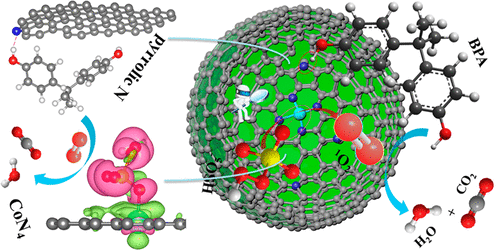
Recently, a research team led by Profs. HUANG Yanqiang and ZHANG Tao at the Dalian Institute of Chemical Physics (DICP) of the Chinese Academy of Sciences collaborated with Prof. LIU Bin from Nanyang Technological University of Singapore reported their findings on developing single cobalt atom catalysts for efficient Fenton-like catalysis in J. Am. Chem. Soc.
Fenton-like process via activation of peroxymonosulfate (PMS) has been regarded as a promising strategy to deal with the ever-growing environmental pollution and scarcity of fresh water resources resulted from rapid civilization and industrialization.
However, the development of improved catalysts with adequate activity and stability is still a long-term goal to realize their practical application. As radical predominant reaction, the half-life periods of most reactive oxygen-containing radicals generated from PMS activation are quite short. In this regard, approaches to minimize the migration distance of the reactive radicals to the target organic molecules are therefore highly desirable for maximizing the catalytic performance.

The proposed overall Fenton-like reaction mechanism on single-Co-atom catalyst. (Image by GUAN Jingqi)
The researchers reported single cobalt atoms anchored on porous N-doped graphene as highly reactive and stable Fenton-like catalysts for efficient catalytic oxidation of bisphenol A (BPA) via activation of PMS.
The single-Co-atom catalysts prepared in this work not only provide abundant CoN4 sites with optimal binding energy for PMS activation to produce singlet oxygen as active species, but also afford rich pyrrolic N sites for organics adsorption. The dual reaction sites greatly reduce the migration distance for the active species and thus improve the Fenton-like catalytic performance.
This study details the first insights into single-atom based catalysts for the Fenton-like reaction. Moreover, the proposed dual-reaction-site mechanism shall shed light on the development of other "single-atom catalysts".
The research was supported by the National Key Projects for Fundamental Research and Development of China and the Strategic Priority Research Programme of the Chinese Academy of Sciences.

86-10-68597521 (day)
86-10-68597289 (night)

86-10-68511095 (day)
86-10-68512458 (night)

cas_en@cas.cn

52 Sanlihe Rd., Xicheng District,
Beijing, China (100864)

